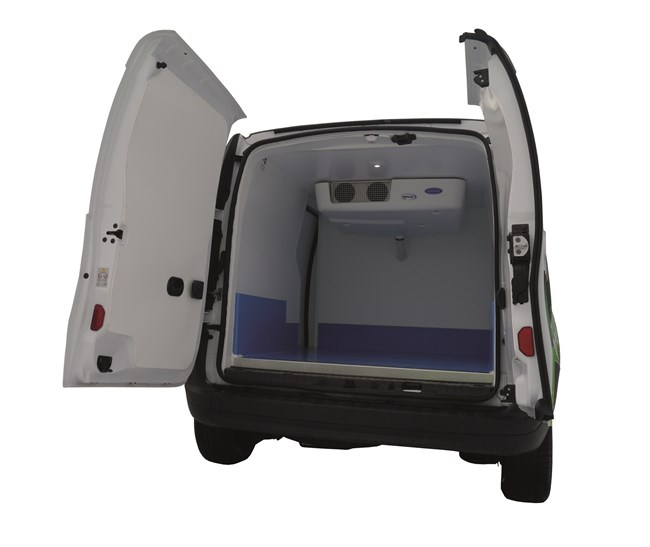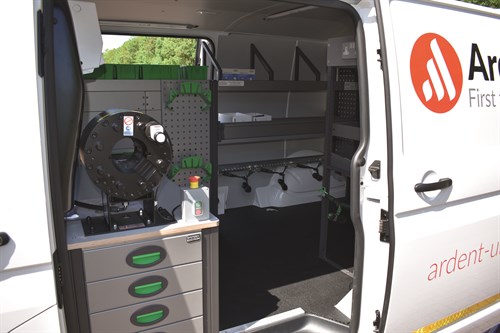- ETRUX launches new Ford E-Transit Trizone
- Renault gives UK debut to Master E-Tech at CV Show
- Isuzu D-Max long-term test – Latest Report
- Isuzu D-Max V-Cross Steel Edition revealed
- IVOTY Report: Stellantis explores the hydrogen proposition
- New Maxus EVs include eDeliver 5 van
- Used LCV values reach six-month high
- ADVERTISEMENT FEATURE: IVECO Daily Mission Awards 2024 Q2 Round-up: Grounds Maintenance & Forestry
- Stellantis Pro One electric vans review
- Mitie adds 5,000th EV to fleet
What Van? Awards 2023: Converter of the Year – CoolKit
Date: Friday, December 16, 2022

Well-known as an innovator and the UK’s leading producer of refrigerated van conversions, CoolKit is the winner of the What Van? Converter of the Year award.
Serving a wide range of businesses that transport everything from chilled and frozen food to pharmaceuticals and environmental samples, it boasts a bulging portfolio of accreditations from manufacturers.
Ford, Renault, Toyota and Volkswagen are all on the list. So is Stellantis, which includes Citroën, Fiat Professional, Peugeot, and Vauxhall.
CoolKit is also a preferred supplier to a number of well-known leasing companies, including ALD Automotive, Alphabet, Arval, LeasePlan, Lex Autolease , Novuna and Zenith. It has won numerous awards for innovation, engineering, technical excellence and quality.
Its portfolio includes conversions for major fleets that have procured their own vans, a stock of ready-converted vans for small businesses, and kits which body builders can use to produce vehicles themselves.
With over 100 employees, CoolKit’s 70,000sq ft workshops can work on up to 60 vans simultaneously and can now produce well over 1,500 conversion units annually. In 2021 it was able to increase weekly output by more than 60% by upskilling, reorganising and restructuring shifts, and by implementing a number of other operational improvements.
They included creating a new head of technical and development role, and appointing an engineering graduate using support from the Knowledge Transfer Partnership and Manchester Metropolitan University.
All of the company’s own products are designed and built in-house, and it has the ability to complete large batches of work quickly. It has recently done so for some of the country’s biggest pharmaceutical delivery fleets, including AAH and Alliance Healthcare.
CoolKit’s recent innovations include the exclusion of timber from composite panel construction. Average payload is up by 5% as a result, and such a change does of course help to reduce deforestation.
Improving vehicle payloads helps reduce highway congestion and thus emissions, the business argues, because fewer vans are needed to deliver the same amount of goods.
The firm is carrying out research into alternative insulating materials and cooling methods which should among other things improve compliance with the End of Life Vehicle Directive.
Always conscious of the move towards zero emissions, CoolKit has constructed an all-electric milk float with a 200-mile range between recharges using a Maxus eDeliver3 as a platform. Four of these vehicles are now in service with The Modern Milkman.
Continuing with the theme of sustainability, the company has been accredited to the ISO14001:2015 environmental management standard for the past 12 years. The drive for continuous improvement is being backed by a UCLan (University of Central Lancashire) plan for carbon footprint reduction.
The changing workshop shift patterns referred to earlier have resulted in increased demand for energy. Vans being constantly brought in and out mean that factory doors are left open, resulting in heat loss.
To combat this, CoolKit is installing high-speed insulated doors with proximity activation that are anticipated to halve gas consumption. What is more, it has already had around 30,000sq ft of solar panels mounted on the roof of its main factory; and is in the process of installing more.
Highly Commended: System Edstrom

Van load area racking specialist System Edstrom receives our Highly Commended accolade, and is to be particularly applauded for the efforts it has made over the past five years or so to reduce the environmental impact of its activities. Measures it has taken include cutting the use of plastics and its own CO2 emissions.
The weight of its racking has been reduced too. Safety continues to be a key priority, with products extensively tested at leading test house RISE; Research Institutes of Sweden.
System Edstrom has increased workshop and storage capacity at its Corby, Northamptonshire, UK headquarters. By doing so it has gone a long way towards eliminating potential bottlenecks by allowing customers vehicles to be delivered there direct from the manufacturers, and held until they can be converted.
They are then dispatched to the waiting client so that they can be put to work as quickly as possible.
Its warehouse operation has been expanded at the same time, a move which has boosted the efficiency of parts deliveries to customers.
The business is especially adept at tailoring load area storage systems to meet the needs
of individual fleets. It takes full responsibility for design, installation, inspection, and delivering the completed package in line with the client’s specifications.
View The WhatVan Digital Edition


